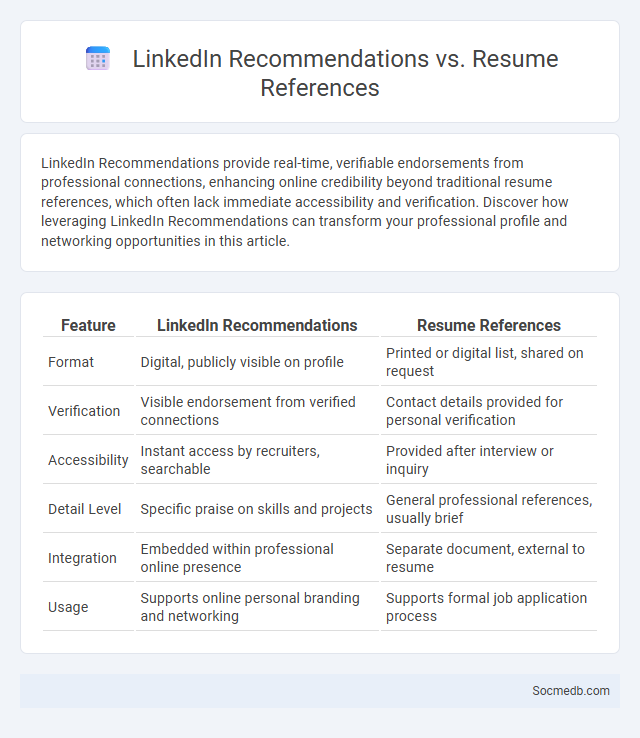
Photo illustration: LinkedIn Recommendations vs Resume References
LinkedIn Recommendations provide real-time, verifiable endorsements from professional connections, enhancing online credibility beyond traditional resume references, which often lack immediate accessibility and verification. Discover how leveraging LinkedIn Recommendations can transform your professional profile and networking opportunities in this article.
Table of Comparison
| Feature | LinkedIn Recommendations | Resume References |
|---|---|---|
| Format | Digital, publicly visible on profile | Printed or digital list, shared on request |
| Verification | Visible endorsement from verified connections | Contact details provided for personal verification |
| Accessibility | Instant access by recruiters, searchable | Provided after interview or inquiry |
| Detail Level | Specific praise on skills and projects | General professional references, usually brief |
| Integration | Embedded within professional online presence | Separate document, external to resume |
| Usage | Supports online personal branding and networking | Supports formal job application process |
Introduction to Professional Credibility Tools
Professional credibility tools on social media enhance Your online presence by showcasing verified skills, endorsements, and achievements that build trust with potential employers and clients. Platforms like LinkedIn offer certifications, recommendation features, and portfolio integrations designed to highlight Your expertise and professional reputation. Leveraging these tools strategically increases visibility and establishes a strong digital footprint critical for career advancement.
Defining LinkedIn Recommendations
LinkedIn Recommendations are personalized endorsements written by colleagues, clients, or supervisors that highlight Your professional skills and work ethic. These testimonials enhance Your profile's credibility by providing authentic insights from real connections, boosting visibility in search results. Leveraging LinkedIn Recommendations strategically can strengthen Your network influence and attract potential employers or business opportunities.
Understanding Resume References
Social media platforms have become crucial tools for understanding resume references by providing additional context about a candidate's professional network and interpersonal skills. Employers often cross-check LinkedIn profiles and public posts to verify the authenticity of references and gain insights into the applicant's work ethic and communication style. Leveraging social media data helps recruiters make informed decisions by assessing the credibility and relevance of listed references beyond traditional contact methods.
What is Personal Branding?
Personal branding is the practice of creating and promoting a unique identity that highlights your skills, values, and expertise to stand out on social media platforms. It involves strategically sharing consistent content that resonates with your target audience and builds trust over time. Your personal brand helps establish credibility, attract opportunities, and differentiate you in competitive digital environments.
Key Differences: Recommendations vs References
Recommendations on social media involve personalized endorsements where users explicitly suggest products, services, or content based on their positive experiences, often influencing purchasing decisions directly. References, however, typically provide indirect mentions or citations of brands or content within posts, serving as subtle acknowledgments without an explicit call to action. Understanding this distinction helps marketers tailor strategies, leveraging recommendations for trust-building and conversions, while using references to increase brand visibility and awareness.
The Role of LinkedIn in Personal Branding
LinkedIn serves as a powerful platform for personal branding by enabling professionals to showcase their expertise, achievements, and network connections directly to industry peers and potential employers. Your LinkedIn profile acts as a dynamic digital resume, enhanced by endorsements, recommendations, and content sharing that establish credibility and thought leadership. Consistent engagement on LinkedIn attracts relevant opportunities, strengthening your professional identity and market visibility.
Impact on Career Opportunities
Social media significantly influences career opportunities by shaping your professional brand and network visibility. Recruiters often evaluate candidates based on their online presence, making it crucial to maintain a polished and relevant profile across platforms like LinkedIn and Twitter. Engaging actively with industry-specific content and communities enhances your chances of being discovered for job openings and collaborations.
Best Practices for Leveraging Recommendations
Leveraging recommendations on social media involves showcasing authentic user testimonials and integrating influencer endorsements to build trust and credibility. Utilizing platform-specific features such as Instagram's Stories highlights or LinkedIn's recommendation section maximizes visibility and engagement with potential customers. Regularly updating and responding to recommendations enhances reputation management and fosters strong community relationships.
Aligning References with Your Personal Brand
Aligning references with your personal brand on social media enhances credibility and reinforces your unique value proposition. Consistently citing sources that reflect your expertise, values, and industry standards strengthens audience trust and brand coherence. Leveraging endorsements and testimonials that resonate with your brand identity amplifies your professional reputation and engagement.
Strategic Integration for Career Success
Strategic integration of social media enhances career success by enabling professionals to build a strong online personal brand, expand industry networks, and showcase expertise through targeted content. Leveraging platforms like LinkedIn, Twitter, and Instagram facilitates real-time engagement with recruiters and thought leaders, increasing visibility in competitive job markets. Consistent, authentic interaction combined with data-driven content strategies optimizes opportunities for professional advancement and skill recognition.
 socmedb.com
socmedb.com